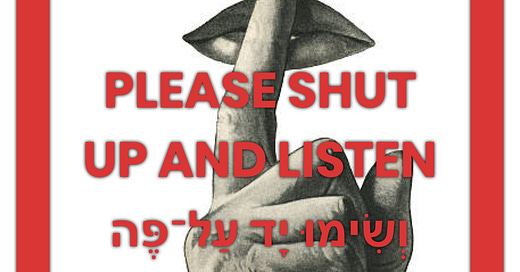When was the last time you were engaged in honest, heart centered dialogue with someone with whom you fundamentally disagree with? Have we lost the wise patient skills of listening to each other’s truths and pains?
Halfway through the Book of Job we are reminded of the difference between monologues and dialogues. We often consider the difference to be centered on the number of speakers—one for a monologue, two or more for a dialogue. But that’s just surface-level. A monologue can happen in a room full of people, while a dialogue can take place within oneself. It’s not about form but approach: in a monologue, you know exactly where you’re headed. In a dialogue (or polylogue?) one starts in one place, but is open to whatever happens.
Dialogue invites uncertainty and demands a willingness to be transformed. It begins with the will to really listen.
And here’s where Job’s story cuts to the bone. His friends think they’re engaging in dialogue, but what they’re really offering is a dressed-up monologue. They fail to hear his hurt, listening just enough to launch into their ready-made answers about the way the world works - but they’re not really hearing him or his pain.
Job’s response in today’s chapter names the need to be in dialogue and hear each other before pronouncing one’s position:
שָׂאוּנִי וְאָנֹכִי אֲדַבֵּר וְאַחַר דַּבְּרִי תַלְעִיג׃ הֶאָנֹכִי לְאָדָם שִׂיחִי וְאִם־מַדּוּעַ לֹא־תִקְצַר רוּחִי׃ פְּנוּ־אֵלַי וְהָשַׁמּוּ וְשִׂימוּ יָד עַל־פֶּה׃
Suffer me that I may speak; and after I have spoken, mock on.
As for me, is my complaint to people? Why should I not be impatient?
Turn to me, and be astonished, and place your hand upon your mouth.
Job 21:3-5
Job is imploring them to truly listen—not just to his words but to his pain, and he has lost patience with their rush to judgment.
They assume, with good intentions, that he wants an answer to his suffering, but Job is after something deeper. The tidy theology they peddle—where the wicked suffer, and the righteous prosper—rings hollow to him. Look at the world, he argues: The wicked often live long, comfortable lives, their children flourishing. Where’s the justice in that? For Job, this isn’t a personal grievance; it’s a philosophical crisis. If justice isn’t evident, how can anyone find meaning? And if we don’t pause to truly hear each other - how can any suffering be borne at all?
Job’s deeper fear and mourning rage isn’t just his own suffering but the terrifying possibility of a world ruled by blind chance. It’s this fear of a cosmos without moral balance—that Job desperately seeks to understand. Yet his friends, clinging to their rigid frameworks, fail to meet his hurt and angst. They are in monologue mode. It’s not helping Job - and it doesn't help any of us.
Dialogue, Job teaches us, is about risk. It requires stepping into the unknown, leaving behind the safety of fixed beliefs. Job’s words remind us here that real comfort doesn’t come from certainty; it comes from shared humanity.
In our polarized world, we often play the role of Job’s friends, quick to judge and slow to listen. We reduce complex realities to simple narratives, mistaking debate for dialogue. But Job calls us to a higher standard. He reminds us that dialogue starts with humility, with waiting long enough, hand on mouth, before we talk back, committed to the radical act of setting aside our need to be right and simply bearing witness to each other’s story.
Will we dare to embrace true dialogue—open, vulnerable, and transformative? That’s where healing begins, and like Job, we are all in dire need of whatever it will take to help us heal and help hold each other’s heart. It begins by learning how to truly listen to each other.
Below the Bible Belt: 929 chapters, 42 months, daily reflections.
Become a free or paid subscriber and join Rabbi Amichai’s 3+ years interactive online quest to question, queer + re-read between the lines of the entire Hebrew Bible. Enjoy daily posts, weekly videos and monthly learning sessions. 2022-2025.
Become a Paid Subscriber? Thank you for your support!
#Job #IYOV #Job21 #hebrewbible #כתובים #Ketuvim #Hebrewbible #Tanach #929 #איוב #חכמה #labshul #belowthebiblebelt929
#dialogue #shutupandlisten #couragousconveratsions #letstalk #canyouhearme? #moralresponsibility #facetoface #peace #prayforpeace #nomorewar #hope #peaceisposible #life’sbigquestions #wordswillhealus #dialougenotdebate




I’ve been doing more writing lately, some serving as written dialogue with another, and another piece dialogue with an unknown audience being vulnerable, about giving up some of my fixed beliefs, evolving. Living with uncertainty is indeed sometimes the very best we can do. Thank you for today’s commentary.